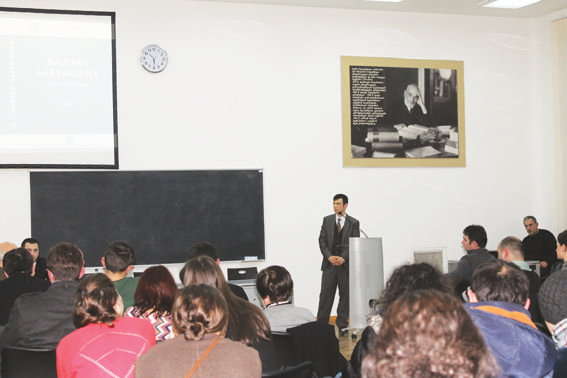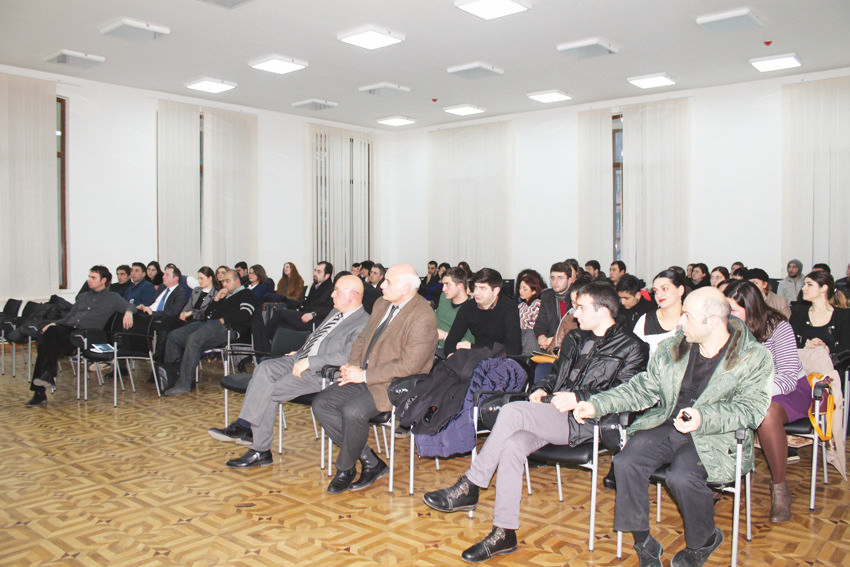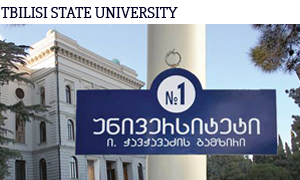
FACULTY OF PSYCHOLOGY AND EDUCATIONAL SCIENCES
LABOR LAW FOR THE IMPROVEMENT OF THEORETICAL KNOWLEDGE AND ACTIVE LEGISLATION
In Georgia, the new Labor Code came into force in 2006 after several years of floundering without any theoretical principles. There were no legal bases for employment law nor was any significant education offered in the field. In the beginning, employment law was a compulsory discipline in higher educational institutions for legal studies, yet professors had no educational materials except for the legal code and a few articles.
A first publication appeared only in 2011 by the Law Faculty of Tbilisi State University, entitled Labour Law – A Collection of Articles, and treated the most pressing issues of Georgian employment law. It aimed to fill a vacuum in the field. A second collection appeared in January 2014, and was a logical continuation of the previous publication. Meridiani Publishing, a project partner, defrayed all financial and technical expenses for publishing these collections. Giorgi Amiranashvili, co-author of the collection and PhD student at the TSU Faculty of Law, stated that a decision was made to prepare articles instead of writing a new textbook, as they would be more adapted to the situation, given the instability of employment legislation. MA theses that have been successfully defended at the TSU Faculty of Law are also included in the publication.


Vakhtang Zaalishvili, LLD is the editor of the first edition of Employment Law – A Collection of Articles. Among the authors are professors and young researchers. Issues addressed include freedom of employment; legal consequences of discriminatory questions asked by an employer to candidates before signing an employment contract; compensation of damages for violating pre-contractual liabilities; characteristics of employer’s legal status; prohibition of discrimination in labor relations; employee health insurance; peculiarities for termination of an employment contract; judicial practice in resolving labor disputes, etc. The second collection is composed of eight articles including an analysis of new regulations from a scientific point of view, and establishes a strong basis for existing judicial practice.
One chapter, “Peculiarities of Reviewing Labor Discrimination Disputes” by Zakaria Shvelidze analyzes judgments delivered by the Supreme Court of Georgia in 2010 on discriminatory treatment, which was not typical of previous judicial practice. The article studies the process of dispute development in three instances and outlines the peculiarities of reviewing cases related to discrimination. The author assesses the validity of court discussions on the absence of discrimination.
A chapter by Tatia Kereselidze, “Controlling the Content of Standard Conditions of Contract” treats how employers set conditions when drawing up and concluding an employment contract. In “Peculiarities of Working Time” by Mariam Bajiashvili, she compares German norms regulating working time and shows how comprehensively this sphere is regulated in Georgian Labor Code and what particular improvements are needed.
The peculiarities of regulating overtime work, using comparative examples from Georgian and German laws are analyzed in “Regulation of Overtime” by Salome Kavtaradze, enabling readers to evaluate the positive and negative differences between the two systems.
In “Prohibition of Competition after Completion of Labor Relations” by Tatia Berikelashvili practices from countries with developed legal systems are analyzed to better understand which approach would be more appropriate for Georgia. The work also provides guidelines to assist courts discuss and resolve disputes related to agreements on the prohibition of competition.
Two chapters are dedicated to the employer’s liability in case of harm caused by an employee to a third person. These authors, Giorgi Amiranashvili and Tamar Shudra, analyze relations regulated by article 997 of the Civil Code of Georgia and the preconditions for using this norm.
The article “Protection of an Employee in the Contract Concluded with Participation of a Foreign Party” by Salome Pruidze reviews norms protecting employees in employment contracts drawn up according to EU laws, and a comparison of these norms with Georgian law. It also aims to highlight problems and shortcomings existing in Georgian law, to outline ways to resolve these problems, and make recommendations.
The work by Ucha Dzimistarishvili “Labor Relations between Administrative Agency and Employee” focuses on whether Georgian legislation on public service meets modern requirements or whether it needs systemic changes.
Professor Besarion Zoidze, LLD and editor of the second publication on employment law, explains that “in the collection, young researchers analyze problems by using comparative methods and provide interesting proposals on how to improve current legislation. The key value of the collection is that it addresses major issues that will have an important impact on the further development of Georgian labour law.”
Both volumes are significant and invaluable references for Georgian students of law and their professors, as well as for practicing lawyers or other professionals. Given the topicality of these and other legal issues, the TSU Faculty of Law has begun work on a third volume has been funded by the Deutsche Gesellschaft für Internationale Zusammenarbeit (GIZ) and will be available in January 2015.




